Image Credit: Steve Zylius/University of California, Irvine.
In 2016, an extraordinary discovery by a doctoral student at the University of California, Irvine (UCI), Mya Le Thai, opened new doors in battery technology. This serendipitous find could lead to rechargeable batteries that last up to 400 years, potentially revolutionizing the longevity of laptops and smartphones while significantly reducing lithium-ion battery waste in landfills.
Originally, the UCI research team focused on nanowires for use in batteries. However, these thin, fragile wires tended to degrade and crack after numerous charging cycles—a process where a battery is charged from empty to full and then discharged back to empty. This limitation posed a significant challenge.
Thai, experimenting on a whim, decided to coat gold nanowires with manganese dioxide and an electrolyte gel resembling Plexiglas. This unique combination yielded astonishing results. Reginald Penner, chair of UCI’s chemistry department, recalled the momentous findings: “She began cycling these gel capacitors, and to our surprise, they continued working past 10,000 cycles. Days later, she reported they reached 30,000 cycles. This trend persisted for a month.”
Unlike typical laptop batteries, which last only 300 to 500 charge cycles, the nanobattery developed at UCI endured 200,000 cycles over three months. This durability suggests an average laptop battery life could extend to approximately 400 years. Although the device itself might not last as long, the implications of such a long-lasting battery are profound.
Penner highlighted the broader significance:
“The key takeaway is that stabilizing nanowires might be simpler than previously thought. If this method proves broadly applicable, it would represent a major advancement for the field.”
This unexpected lab experiment could pave the way for significant improvements in battery technology, offering more sustainable and long-lasting power sources.
This breakthrough is particularly promising given the environmental impact of disposable batteries. The prospect of extending battery life by centuries could lead to fewer batteries being discarded, thereby reducing environmental pollution and conserving resources.

